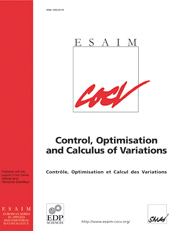Article contents
Regularization method for stochasticmathematical programs with complementarity constraints
Published online by Cambridge University Press: 15 March 2005
Abstract
In this paper, we consider a class of stochasticmathematical programs with equilibrium constraints (SMPECs) thathas been discussed by Lin and Fukushima (2003). Based on areformulation given therein, we propose a regularization methodfor solving the problems. We show that, under a weak condition, anaccumulation point of the generated sequence is a feasible pointof the original problem. We also show that such an accumulationpoint is S-stationary to the problem under additional assumptions.
Keywords
- Type
- Research Article
- Information
- ESAIM: Control, Optimisation and Calculus of Variations , Volume 11 , Issue 2 , April 2005 , pp. 252 - 265
- Copyright
- © EDP Sciences, SMAI, 2005
References
- 4
- Cited by


